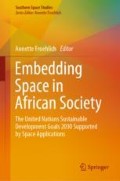Abstract
The UN 2030 SDG (Sustainable Development Goals) identifies agriculture as one of the sectors unparalleled in terms of its potential to support human development whilst, simultaneously, supporting sustainable economic growth. By assisting farmers in developing countries to become as least as productive as their counterparts in the developed world, agricultural productivity can therefore be used as a key strategic socio-economic change agent. In Africa and in particular sub-Saharan Africa, agriculture has a significant socio-economic impact. This sector is on average the largest source of employment, but plagued by low productivity, it does not translate into an equal quantum of economic contribution. Sub-Saharan Africa in particular is well suited to benefit in this space, with a rapidly growing population, large under-utilised agricultural areas and low traditional agricultural productivity. Rapid simultaneous technological development in the so-called SMACT (BTC http://www.boston-technology.com/smact/ accessed 5 July 2018) group in particular holds great promise to assist farmers in developing world. The idea of this essay is to explore how satellite technology can act as an enabler of “Info-Agritech”—(the application of information technology in agriculture)—in terms of the sub-Saharan Africa agricultural sector.
Access this chapter
Tax calculation will be finalised at checkout
Purchases are for personal use only
Notes
- 1.
Bernard Meyerson Chief Innovation Officer IBM as WEF agenda contributor.
- 2.
The Borgen Project https://borgenproject.org/ accessed 7 July 2018.
- 3.
COMMITTEE ON WORLD FOOD SECURITY—Thirty-ninth Session, 2012 http://www.fao.org/bodies/cfs/cfs39/en/ accessed 8 July 2018.
- 4.
WHO http://www.who.int/elena/titles/full_recommendations/sam_management/en/ accessed 7 July 2018.
- 5.
‘The Sustainable Development Agenda’ www.un.org/sustainabledevelopment/development-agenda accessed 15 January 2018.
- 6.
Brinkman, Henk-Jan, and Cullen S. Hendrix. “Food Insecurity and Violent Conflict: Causes.” Consequences, and Addressing the Challenges (2011) World Food Programme.
- 7.
Lagi, Marco, Karla Bertrand, and Yaneer Bar-Yam. “The food crises and political instability in North Africa and the Middle East.” (2011).
- 8.
The World Bank https://data.worldbank.org/indicator/NV.AGR.TOTL.ZS accessed 10 July 2018.
- 9.
- 10.
- 11.
- 12.
Robert K. Merton "The Matthew effect in science: The reward and communication systems of science are considered." (1968) Science 159.3810 p56.
- 13.
WEF 4 reasons 4 billion people are still offline https://www.weforum.org/agenda/2016/02/4-reasons-4-billion-people-are-still-offline/ accessed 7 June 2017.
- 14.
EutelSat https://www.eutelsat.com/en/satellites/the-fleet/EUTELSAT-KA-SAT.html accessed 1 July 2018.
- 15.
Samantha Masunaga, “Satellite constellations could be poised to challenge the broadband industry” (2017) https://phys.org/news/2017-01-satellite-constellations-poised-broadband-industry.html accessed 10 July 2018.
- 16.
UCS Satellite Database https://www.ucsusa.org/nuclear-weapons/space-weapons/satellite-database#.W02-eLh9jIU accessed 1 July 2018.
- 17.
Greenspin https://www.greenspin.de/ accessed 5 July 2018.
- 18.
ESA https://www.esa.int/Our_Activities/Observing_the_Earth/Satellites_forewarn_of_locust_plagues accessed 28 May 2018.
- 19.
https://grameenfoundation.org/tags/farmerlink accessed 9 July 2018.
- 20.
Siddique, Talha, et al. “Automated farming prediction.” (2017) Intelligent Systems Conference (IntelliSys), 2017. IEEE.
- 21.
SmallScaleFarmers http://www.agritech-expo.com/SmallScaleFarmers-PR accessed 2 July 2018.
- 22.
RIICE http://www.riice.org/ accessed 2 July 2018.
- 23.
Shamita http://www.samhita.org/social-organisation/reuters-market-light-rml/ accessed 7 July 2018.
- 24.
Mobbisurance https://www.f6s.com/mobbisurance accessed 8 July 2018.
Author information
Authors and Affiliations
Corresponding author
Editor information
Editors and Affiliations
Rights and permissions
Copyright information
© 2019 Springer Nature Switzerland AG
About this chapter
Cite this chapter
Kotze, C. (2019). Sub-Saharan Africa: “Info-Agritech” a Potential Game Changer. In: Froehlich, A. (eds) Embedding Space in African Society. Southern Space Studies. Springer, Cham. https://doi.org/10.1007/978-3-030-06040-4_3
Download citation
DOI: https://doi.org/10.1007/978-3-030-06040-4_3
Published:
Publisher Name: Springer, Cham
Print ISBN: 978-3-030-06039-8
Online ISBN: 978-3-030-06040-4
eBook Packages: Political Science and International StudiesPolitical Science and International Studies (R0)

